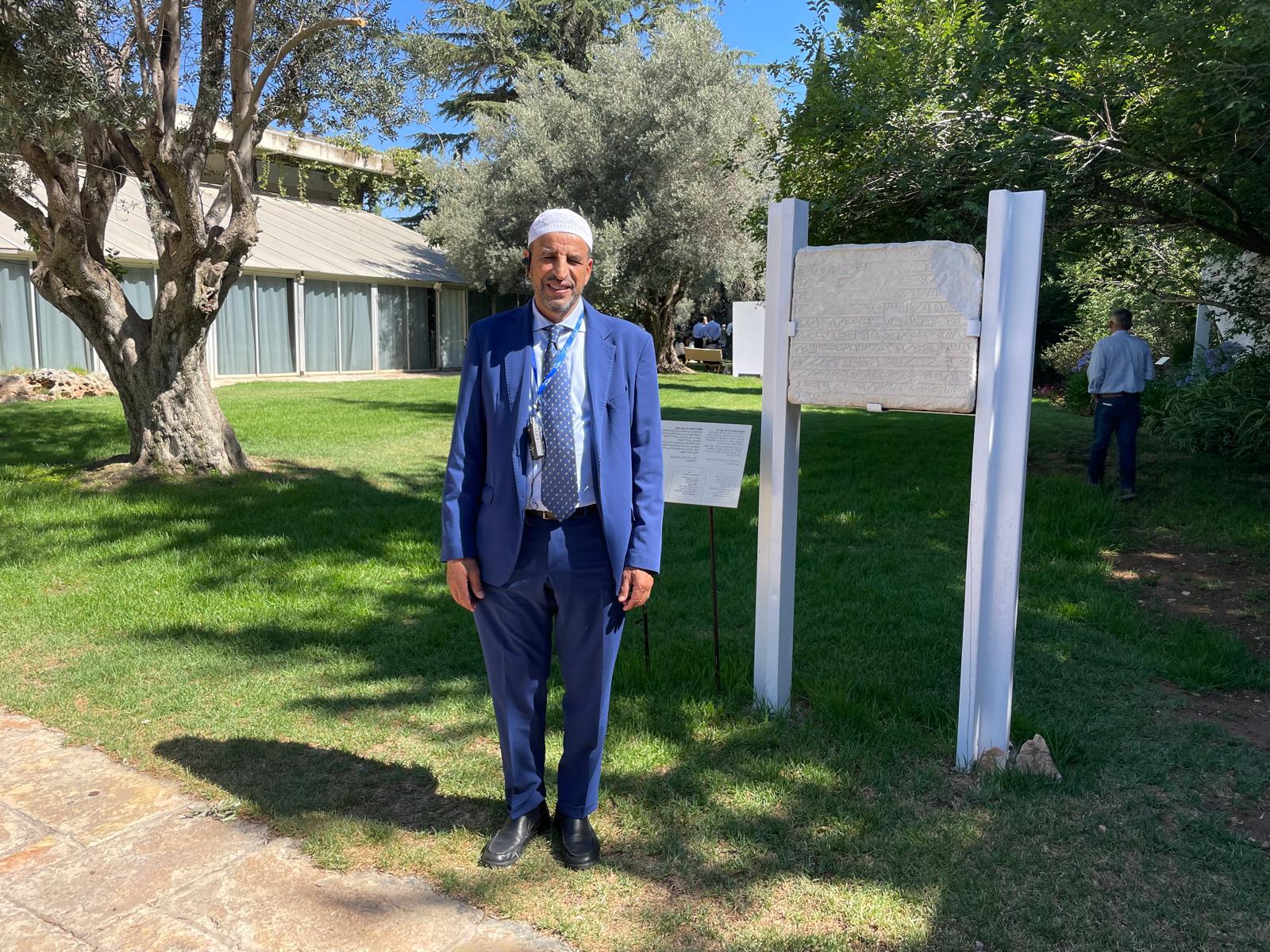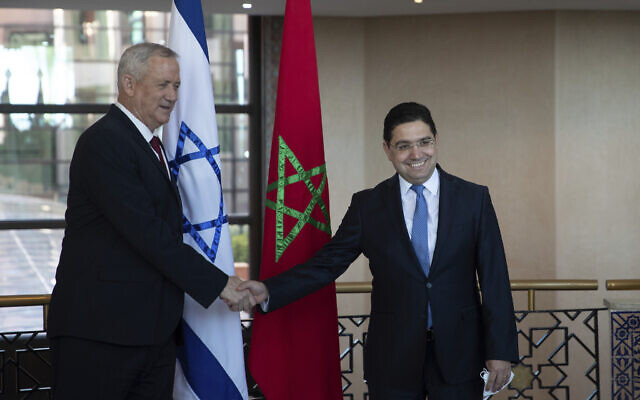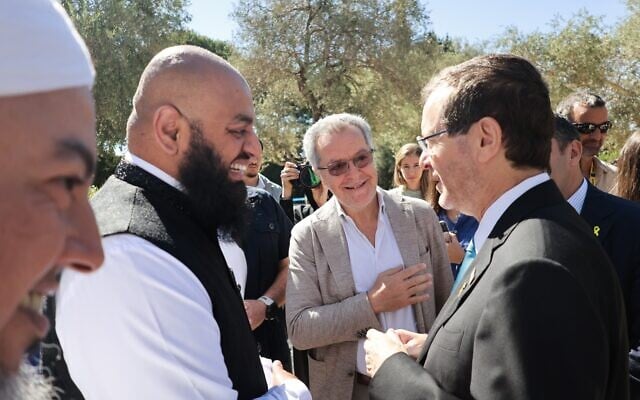



When Imam Youssef Masbeh introduced himself to President Isaac Herzog on Monday, he could not help but start singing a special chant in Arabic, offering a reinterpretation of the Israeli national anthem, Hatikvah.
Masbeh, who has served as a religious leader in the Netherlands, Belgium, and Norway for 20 years, was part of a delegation of about a dozen imams and Muslim community leaders who were visiting Israel from several European countries, including France, the United Kingdom, and Italy.
Masbeh also encouraged his colleagues and all those present to join him in singing and dancing, celebrating the moment of togetherness.
“We are all children of Abraham, and I believe the historic progress in our region is a progress of dialogue between Muslims and Jews, and Jews and Muslims,” Herzog said. “What you’re doing on this visit, and in your courageous work, reflects the silent majority in the Middle East and around the world who yearn for this kind of shared life.”
The delegation was organized by ELNET, an NGO that promotes ties between Europe and Israel.
On Monday, the group also held meetings at the Knesset, before heading to Jerusalem’s Old City to visit Muslim, Jewish, and Christian holy sites, including the Temple Mount, where the Al-Aqsa mosque compound stands.
The trip will also include a visit to the Yad Vashem Holocaust memorial, meetings with Sephardic Chief Rabbi David Yosef and with IDF Arabic Spokesperson Col. Avichay Adraee, and visits with family members of former Bedouin hostages in Gaza and Druze victims of the Majdal Shams massacre at the hands of Hezbollah.
Herzog encouraged the visitors to return to their communities with a message of peace.
“Here in Israel, we want peace,” he said. “We want to see all our hostages back home, and we want to see an end to the suffering of the people in Gaza, too. We want to see better lives for everyone.”
The president also expressed hope that “peace will come with Syria, with Lebanon, inshallah even with Saudi Arabia, and that we will continue moving forward.”

Almost all of the religious leaders were visiting the Jewish state for the first time. For many, being in Jerusalem was especially meaningful.
“I already did my pilgrimage to Mecca and Medina in Saudi Arabia, and I was waiting to come to Jerusalem,” Ali El Aarja told The Times of Israel.
Based in Turin, Italy, El Aarja serves as the president of the newly established Italian Islamic Confederation (CIIN) and is one of the several members of the delegation originally from Morocco.
On the eve of the establishment of the State of Israel in 1948, Morocco was home to some 270,000 Jews, most of whom emigrated to Israel or France in the following two decades.
Though only a few thousand Jews remain in the country, over the past 20 years, the authorities have demonstrated growing attention and sensitivity toward its Jewish community.
In 2020, Morocco joined the Abraham Accords, fully normalizing its ties with Israel.

“Morocco is a country open to all religions: Muslims, Christians, and Jews live together, and we hope we can set an example for the world,” El Aarja said.
“We are here to send a message of peace,” he added. “For our Palestinian brothers and for our Jewish brothers, we do not want war, we hope we can go back to dialogue.”
An ELNET spokesperson told The Times of Israel that participants were selected for the trip in close collaboration with Imam Hassen Chalghoumi, chairman of the Conference of Imams of France. A Tunisia-born interfaith activist, Chalghoumi has been known to many as “the peace imam” and a steadfast supporter of Israel.
“My message to you is one of deep affection — for you and for your remarkable people,” Chalghoumi said, addressing Herzog. “It is a message of brotherhood and solidarity and a heartfelt prayer that the hostages will return home in peace, and that the pain and suffering of innocent civilians in Gaza will come to an end.”

The imam stressed that the regional conflict sparked by the Hamas atrocities on October 7, 2023, “is not merely a conflict between Israel and Hamas, nor between Israel and Hezbollah—the so-called ‘Party of Satan’.”
“It is a confrontation between two fundamentally different worlds,” Chalghoumi said. “You represent the world of brotherhood, of humanity, of compassion. You stand for the values of democracy and liberty.”
According to another member of the delegation, Noor Dahri, founder and executive director of the UK-based organization Islamic Theology of Counter Terrorism, Muslim communities in the Western world often struggle to understand the difference between Islam as a religion and Islamism.
“Extremists are more powerful in Western countries than in the Middle East or in Pakistan because, in the Middle East and Pakistan, there are two types of people — Muslims and Islamists — and Muslims know when an organization is an Islamist organization and they either join it or distance themselves from it,” Dahri told The Times of Israel.
“In the West, everything is mixed and people do not know how to make the distinction,” he said. “For decades, the majority of mosques have been run by Islamist charity organizations, so they managed to establish deep roots in the Muslim communities, and it’s difficult to root out Islamism from Western-world Islam.”
For this reason, Dhari said that bringing imams to visit Israel is a very important initiative.
“Since October 7, even those Muslims who were previously supportive of Israel and Israelis either turned their backs or kept silent in fear of their life,” he said. “Now, this delegation of imams and religious scholars from different Muslim backgrounds has come to Israel to send one message across the Muslim world — that the Jewish nation is not the enemy of Muslims, that the State of Israel is not against Islam, and we Muslims should not have any enmity toward the Jewish people because they are our cousins, and they are fighting against Islamism.”
